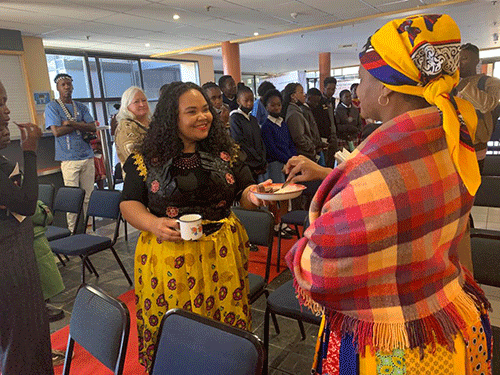The National Archives of Namibia is encouraging Namibians to continue protecting natural and cultural resources as if they are unique and placing the accountability of preservation on the current generation.
That was said by the director of National Archives of Namibia Library and Archives Services Sarah Negumbo during an event that celebrates Heritage Week in Namibia at the National Archives in Windhoek on Wednesday.
Heritage Week is celebrated every year from 16 to 22 September.
The annual event gives an opportunity to celebrate heritage in Namibia.
During the week, the natural and historical sites, the objects protected by museums, arts and crafts and the traditional knowledge passed down from generation to generation are all celebrated.
This year’s theme for heritage week is ‘Hao wese g//e-//xae’, which translates as unity in diversity.
It encourages all Namibians to participate in embracing their heritage in all dimensions, such as cultural, traditional, documentary, natural or ecological – and it portrays the aspiration of the Namibian people.
The event was organised by the National Archives of Namibia in partnership with the Museums Association of Namibia, with a focus on sharing and re-telling history they have heard and learned about through the years.
Negumbo said the week is earmarked to celebrate Namibia’s rich and diverse heritage and ensure the culture is thriving by means of passing on inherited traditions and knowledge of the descendants to the future generation.
“The importance of celebrating the heritage week in Namibia is an opportunity for us, Namibians, to display our heritage and also be grateful for the rich heritage we are having,” said Negumbo.
The acting chief archivist at the National Archives of Namibia, Muningandu Ndivanga, highlighted the role of the National Archives of Namibia is to improve governance through accountability and transparency.
The archives house records of German, South African and Namibian governments.
“Some of the original records kept by the National Archives include the Treaty of Hoachanas (1858), the Ryksboek of Bethanie, Vaderlike Wette of the Rehoboth Basters, the Blue Book (1918), the Maharero papers and the Hendrik Witbooi papers,” pointed out Ndivanga.
She explained the materials outlined added to the body of knowledge of Namibia’s documentary heritage.
The chief archivist comprehensively indicated that preserving and providing access to these archival records ensures the support for transparency and good governance to the general public. “These materials provide support for the education and research needs of future generations,” she said.
The event was attended by learners, teachers, librarians and archivists.
Archivist Albertina Nekongo said the National Archives embrace records and archives without discrimination as long as the records are of national or historical importance.
“We are many; we are one. Let us stand together and promote our heritage as a nation, share knowledge and information, and make Namibia a better country. An informed nation is a prepared country; nothing can defeat a well-equipped and informed generation. Our archives can tell us what our country has gone through, and this can serve as a point of departure to building a unified nation,” she said.



